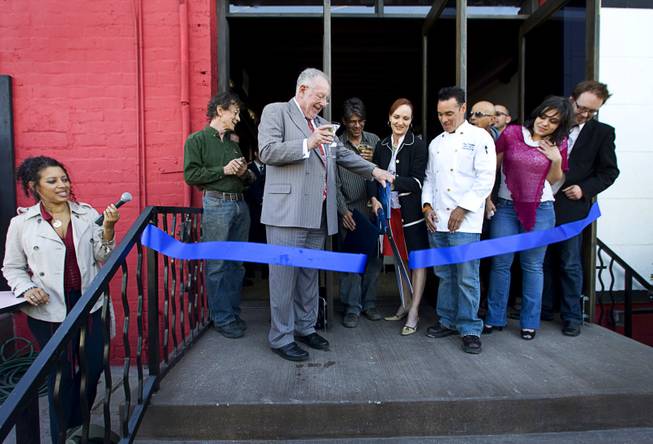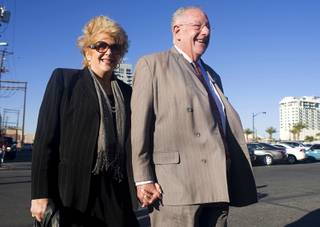
Mayor Oscar Goodman, left, helps cut a grand opening ribbon with Bar+Bistro owners Wes Myles, his wife, Debra Heiser, and Beni Velazquez during a tour of new businesses in downtown Las Vegas Tuesday, April 26, 2011. Three businesses celebrated their grand openings - Renick Grocery in Soho Lofts on Las Vegas Boulevard, Artifice lounge, 1025 S. 1st St., and the Bar+Bistro in the Arts Factory. Another business, the Lady Sylvia bar in the Soho Lofts, is expected to open in about 30 days.
Tuesday, April 26, 2011 | 8:52 p.m.
Let’s call it the mayor’s victory tour, one last lap around his beloved downtown after a hard-fought win.
In one of his last acts as mayor, with a little more than a month before his wife or Chris Giunchigliani is elected to replace him, Oscar Goodman cut ribbons at three new downtown businesses.
As he went from Resnick’s, a small grocery in Soho Lofts, to Artifice and Bar+Bistro, two lounges a few blocks west in the Arts District, people stepped over themselves to congratulate him on downtown’s renaissance.
“Phenomenal,” the mayor would reply.
Evidence of downtown’s turn seems to grow by the week: East Fremont District is starting to fill out its first block, Zappos will move into the City Hall building in two years, the Arts District has its first two bars, and don’t forget the 61-acre Symphony Park.
“It’s all coming together,” he said, taking a sip from a mega-sized martini glass filled with gin and a few olives. “This is what we wanted to happen.”
He stood amid a few dozen people at Artifice, a new lounge that opened in the last month near Main Street and Charleston Boulevard.
People with still and video cameras feverishly positioned themselves for pictures as he cut blue grand-opening ribbons with giant 3-foot long scissors.
Downtown resident Brian Paco Alvarez had his camera. He’s a believer, too. “If it wasn’t for the mayor, none of this happens,” Alvarez said.
Yet you still find people who question what’s happened downtown. They don’t question the good of reviving streets given up for dead just a decade ago and growing businesses. Instead, they wonder if this might have happened faster if the city had paid less attention to mega-projects like stadiums and focused first on small business.
For many years, Goodman’s goal seemed to be the construction of a stand-alone stadium or a stadium as part of a mega-casino/retail complex to draw a professional sports team. Much the way the Running Rebels did in the early 1990s with their championship teams, Goodman believes professional sports has the ability to bind disparate groups of people and foster community where little existed before.
So stadium developers with big promises came and went. And as they did, some small business ideas came and went, as well.
Countless plans for bars and lounges emerged then disappeared. Once there was an idea for a modern museum of art downtown. Four years ago, the city put money into refurbishing a small section of East Fremont and a few bars cropped up. Then the progress appeared to stagnate.
Some downtown thought stagnation resulted from lack of focus in the right places. Sure, the awful economy kept entrepreneurs away. But entrepreneurs also thought the city gave the little guy short shrift while courting developers who promised to change downtown’s landscape with one big project.
Goodman shook his head at the thought. The city had to do it, had to reach for the big projects, many of which came through, like the Lou Ruvo Center For Brain Health, World Market Center and the Smith Center For The Performing Arts. They created credibility among the non-believers.
“No, we did it right,” he said, sitting on a stool at the Artifice bar. “We had to make the public believe that the city had a commitment to downtown.
“We got the attention of the other side of the railroad tracks. They see the city makes a real commitment, and they decide to put their money into it. Then you have ingenious people come up with ideas like waiving the liquor license fees. And we have this, and this is phenomenal.”
James Reza, who owns Globe Salon with his wife, Staci, on the first floor of Soho Lofts, the mayor’s first stop Tuesday night, said downtown “has never had a better cheerleader than Oscar Goodman.”
Westley Myles, owner of Bar+Bistro inside the Arts Factory, which Goodman toasted Tuesday, is the one who came up with the idea to waive liquor license fees. That was years ago. Frustrating for Myles was trying to get city staff to listen to him. But he doesn’t blame the mayor.
“While the mayor is a fantastic champion for downtown, at the end of the day, his power is given to the people he hired,” Myles said. “And those people for a long time didn’t think about building from the ground-up. They thought of big things.”
More than two years ago, Myles talked with the city’s redevelopment people about reducing licensing fees for lounges in the Arts District.
“After about nine months of getting no response, I got pissed, so I talked to the mayor,” Myles said.
Then about 18 months ago, Goodman told Myles the city would move to eliminate the expensive liquor license fees in the Arts District and the East Fremont District. For East Fremont businesses, the change saved $20,000; it saved $50,000 in the Arts District.
North across the parking lot from Bar+Bistro is Artifice.
Goodman stood agog at the old building’s remodeled interior and the art work displayed throughout. He made a toast to Trinity Schlottman and Brett Sperry, Artifice partners, calling it “as cool as it gets.”
Schlottman beamed. But he, too, remembers the years when the city appeared to pay so much attention to the big plans while casting aside the small guys.
He once posited the idea of the city creating a fund to help businesses with the high expenses of bringing old infrastructure up to code, encouraging redevelopment of older buildings.
“It just seemed to go nowhere,” he said.
With that said, the city’s focus seems to have changed in the last year. Waiving the $50,000 liquor license fee, in addition to some $40,000 in redevelopment funding to fix up Artifice’s exterior “helped a lot,” Schlottman said.
He was also stunned that, as he spent the better part of the last year building Artifice, top redevelopment people called to check in, see how it’s going.
“That’s encouraging,” he said.
Encouraging because he and Sperry would like to see some of the older buildings north of Artifice also turned into cool little lounges or coffee shops or whatever else feeds the mind and soul of an urban population.
It wouldn’t just help their lounge. “It would make this a great place to live,” Schlottman said.


Join the Discussion:
Check this out for a full explanation of our conversion to the LiveFyre commenting system and instructions on how to sign up for an account.
Full comments policy